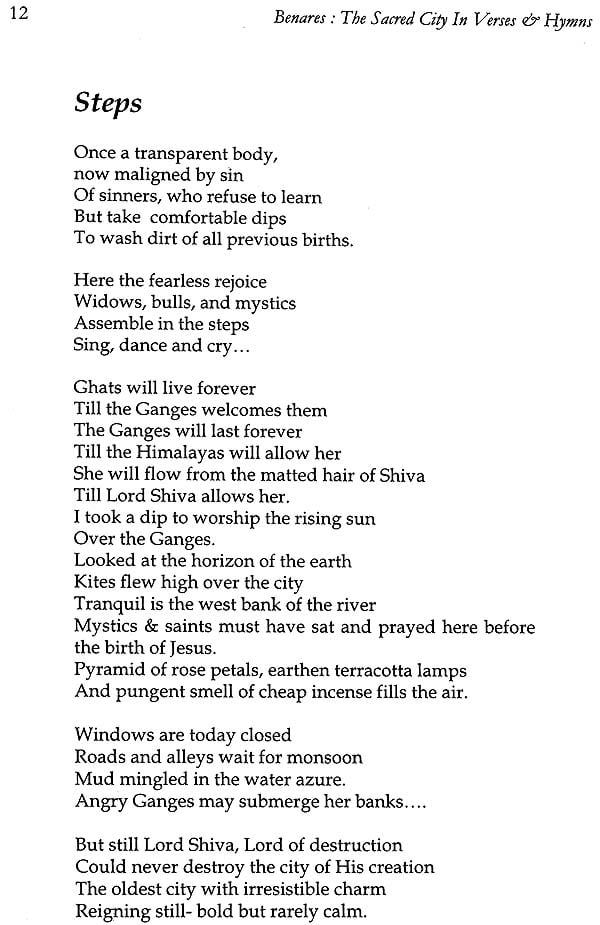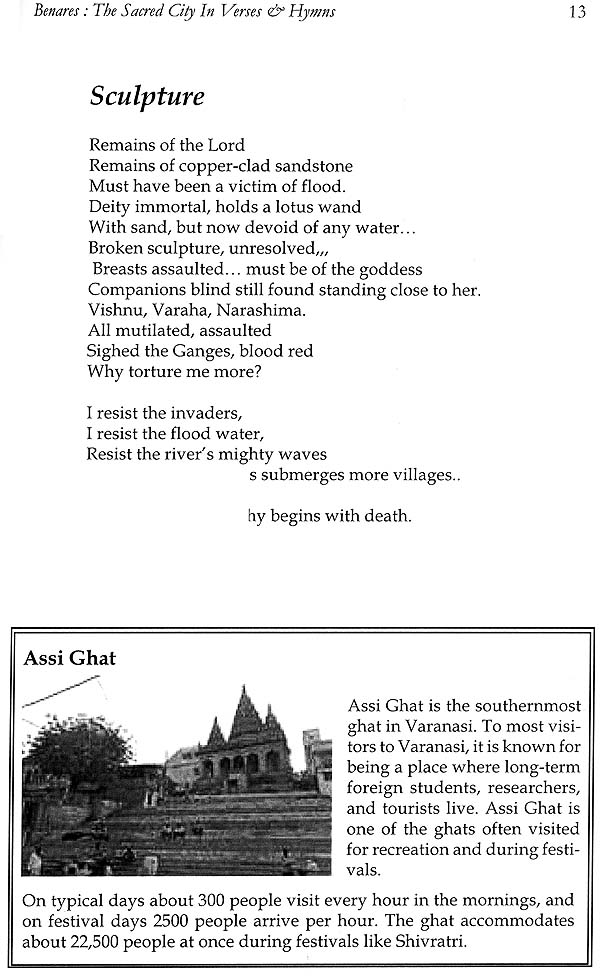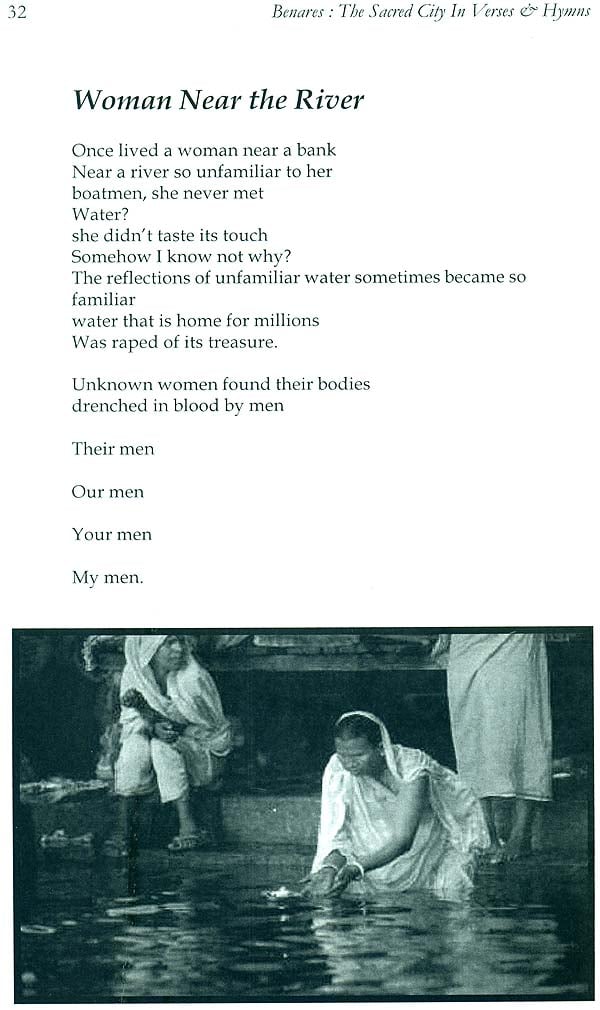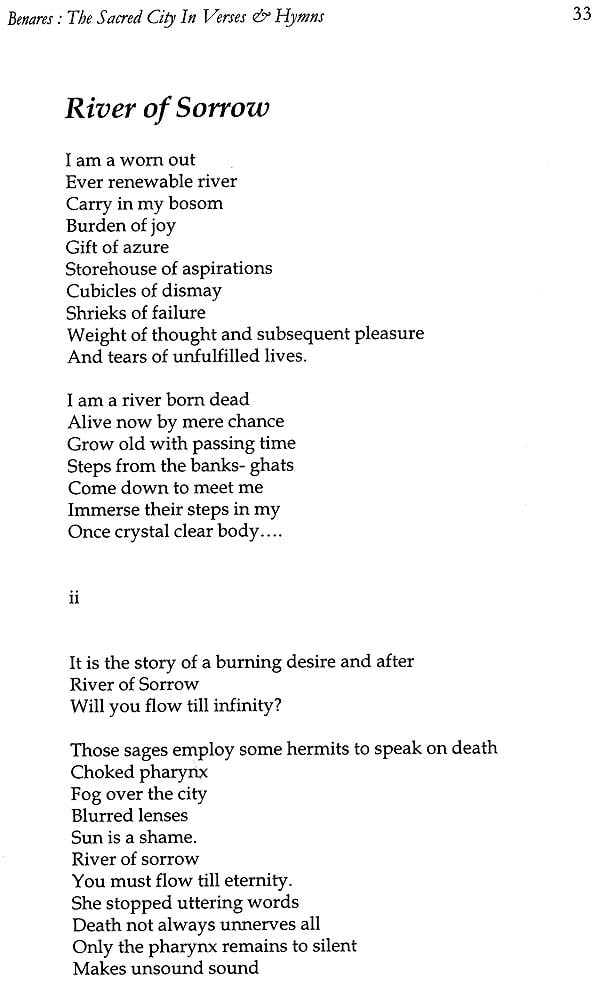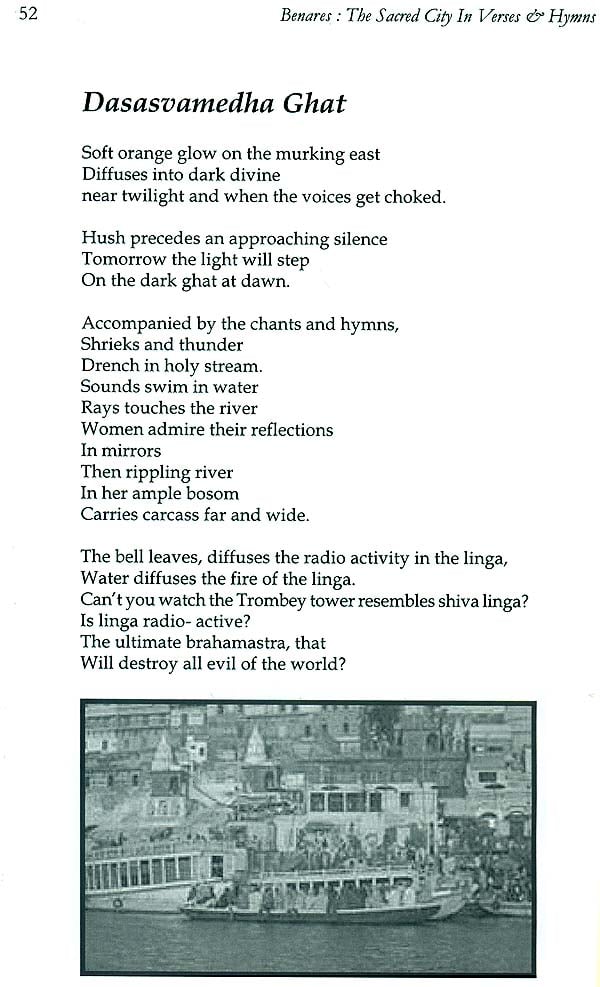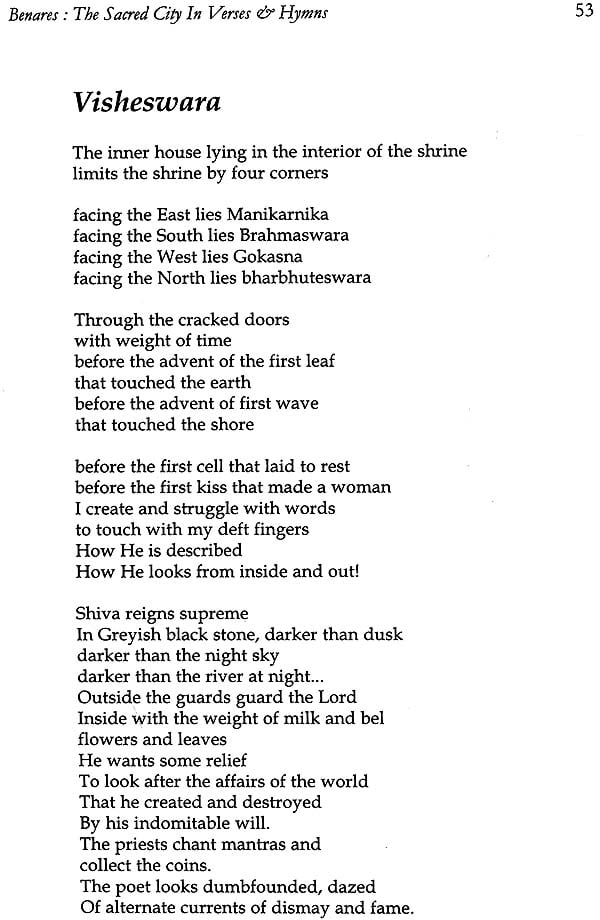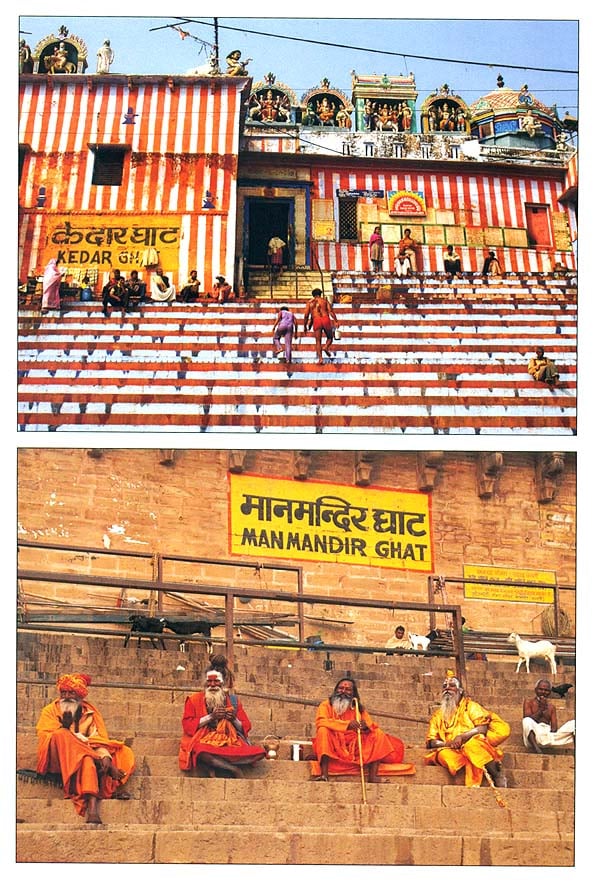
Benares The Sacred City in Verses and Hymns
Book Specification
| Item Code: | NAK207 |
| Author: | Mandira Ghosh |
| Publisher: | Shubhi Publications, Gurgaon |
| Language: | English |
| Edition: | 2016 |
| ISBN: | 9788182903913 |
| Pages: | 65 (8 Color and Throughout B/W Illustrations) |
| Cover: | Hardcover |
| Other Details | 9.0 inch X 6.5 inch |
| Weight | 270 gm |
Book Description
Benares the Secret City - Verse & Hymns is a fascinating volume of verse, and a first of this kind, where the poet pens the verse and hymns on her experience of the city of Benares, and translates her experiences into words and images. The book is a rare combination of spiritual and scientific thoughts, material and metaphysical, ancient and contemporary, religion and sometimes denial of it. The poet mentioned and penned verses on Kashi Viswanath temple, Dashashwamedh Ghat, Manmandir Ghat, the observatory on the same Ghat, the Manikamika Ghat, the Harishchandra Ghat, the Sankat Mochan Hanuman Temple and also on bazaars, airports and hotels. There are several poems on the celebration of death in the city. Death does not unnerves the residents of the city and they have learnt to celebrate death as she realises at the end that end is just the beginning that Lord Shiva is the Ultimate protector who destroys to create creates to destroy.
Standing on the river bank and contemplating on the creative, preservative and destructive aspects of Lord Shiva and Shaivism, her mind gets filled with metaphysical thoughts.
The volume perplexes the readers as they move from the myth, history to the contemporary state of the city. With all its contradictions the city has magic and this enchantment that the poet experiences, when she stands on the river bank, comes out from the Airtport, stands near the library at BHU or worships Lord Visheswara. Her love for the Lord Shiva and His city is profound, Hindus just want to have moksha or liberation ... from suffering and from the material world. An intellectual approach to Shaivism fascinates the poet. Kashi as a eminent city, the city of learning from the time immemorial is a modem city and amidst its contemporary mind set there exists a giant philosophy that this book has tried to portray.
The combination of mundane and spiritual, alternate currents of death and dignity, death and existence, state of women in the context of the city and in general, beauty of the river bank and dust and filth, modem and ancient state are all combined are transferred! translated into verses.
The author of Shiva and Shakti in Indian Mythology, The Cosmic Dance of Shiva and Tantra, Mantra and Yantra has created yet another wonderful book on Lord Shiva, but this time it is a volume of verse.
About the Author
An author and a poet of eminence, Mandira Ghosh was born in Kolkata on 23ro February, 1955. She is a graduate from Indraprastha College, Delhi University and a post graduate in English Literature. She is presently the treasurer of The Poetry Society (India). Mandira Ghosh in her work has arrived at a point where science meets philosophy, literature and all arts. She is a diploma holder in Journalism from Bharatiya Vidya Bhavan, New Delhi and has also obtained B. Ed degree. Her acclaimed books include Aroma (Poetry), New Sun (Poetry), Song in a City (Novel), The Folk Music of the Himalayas, The Cosmic Dance of Shiva, Shiva and Shakti in Indian Mythology, Tantra, Mantra and Yantra, Cosmic Tour(Poetry), and Impact of Famine on Bengali Literature. For her contribution to Indian literature, she has been awarded Senior Fellowship by the Ministry of Culture, Government of India. A distinction holder in Chemistry, Mandira has used scientific terms in poetry. A multi dimensional personality and an extremely disciplined writer she apart from being a poet, is a novelist, researcher, poet critic, thinker and philosopher. She has received the Editor's Choice Award twice in the North American Open Poetry Contest in 1993 and also in July, 2003.
Her poem Next Millennium has been published in America at the Millennium that published best poets and poems of the twentieth century. Her poems, translations, reviews and articles are published in Women Poets of India, Indian Literature, The Journal of the Poetry Society of India, In Many Voices, Contemporary Vibes, Poets International, India International Diary, World to World and more than twenty anthologies published by the International Society of Poets which includes Best Poems of 1996, 97, Best Poems of 90s etc. Her outstanding poems have been published in several websites, the web poetry corner, museindia.com, boloji. com, poemhunter.com etc. Her articles on Indian culture have been broadcast by the External Services Division All India Radio several times.
Mandira Ghosh has been elected and judged several poetry competitions which includes Indian Council of Cultural Relation's Poetry Competition, All India Poetry Competition for School Children and North- East Poetry Festival. She has held Poetry Workshop during North-East Poetry Festival in Guwahati. She is a member of India International Centre, International Society of Poets, Indian Society of Authors, India Habitat Centre, and International Society of History of Religions.
As the full moon of Kartik Purnima enters my new verandah, I open and read the poems that I had written for the past five years on Benares. Moon had travelled for years and so have I.
I started penning the poems on Benares, from my knowledge of the Holy city and also from the research that I had done while penning Shiva and Shakti in Indian Mythology, The Cosmic Dance of Shiva and Tantra, Mantra and Yantra. It is an experience. It is an experience. I also wrote the poems, from my childhood memories, when my father had shown me Benares, from the moving train passing over the bridge while morning towards Kolkata, from Delhi somewhere in time, somewhere in space. My memory was both hazy and bright.
I still remember that dawn. A moving train and a father introducing her small, innocent daughter- See Benares, Kashi, Varanasi, the holiest and the oldest city and the daughter fell in love with the temples, chants, bells and above all a river and her ghats.
Years later, the daughter grew up and wrote
We all have arrived in search of knowledge
In search of divine light
In this holiest pilgrimage.
Before the birth of Jesus, Buddha had arrived
founded Buddhism here around 528 BC
gave his first sermon,
"The Setting in Motion of the Wheel of Dharma", at nearby Sarnath.
Patanjali came in 2nd century
In 8th century, Shankaracharya came and
In the 11th the master of theology
Ramanujam had arrived.
Geniuses, scholars
Mystics, sages and saints
have thronged this place
Why?
I lived near a parched river
Looked eastwards
Somewhere I was born.
Once as a train was passing over the Ganges
Crossing vast span of electric water
It was a morning a hazy land
The river banks had trembled
With sound of chants and bells,
My body had shivered
with Lord's tales.
Women are the instruments of creation, water is the elixir of life that flows into rivers, fire burns all and again water extinguishes fire. Women at the Ghats (steps leading to the river) watch both processes of creation and destruction as the dual faces/forces of energy. At one side fire cooks and on the other it burns our houses, water irrigates and then again causes floods. The dual forces of energy can be seen on the ghats and I have tried to portray the dual forces of sorrow and happiness of women in some of the poems as they step down and walk near the ghats.
Ghats or the steps leading to the river of Benares play an important role in the life of a Hindu woman as from her birth to death, these steps are indispensable. Here she was washed after birth, played with her friend, came with her husband and finally burnt on the pyre. I have chosen death as the motif as Lord Shiva, the prime deity of Benares as well as the country the holiest place in India, is also the lord the destruction and is Mahadeva (The Supreme God).
The poet standing at the Ghats of Varanasi, discovers profound metaphysical truths. Just because of her childhood experience of visiting Benares and Haridwar and developing and understanding Lord Shiva, she later in her life could pen three books connected to Shiva. With her love of nature, poetry and mysticism, the fourth book related to Lord Shiva turned out to be written in verse.
Brahma, Vishnu and Mahesh constitute the great triad of Hindu pantheon. Brahma the creator, Vishnu the preserver and Shiva (Mahesh) the destroyer of the Universe. Shiva holds the trident, the emblem of his supreme power, representing the three gunas- satva, rajas and tamas - through which he commands the world. He alone is the God of death and resurrection of the flux of being and non-being.
A report by Binay Singh on 4th February, 2014 , published in Times of India, mentions
"The archaeological remains found at Akatha suggested that it had a settlement in 1800 BC while Ramnagar had settlement in 1750 BC. These findings of Akatha and Ramnagar compelled us to do a fresh exercise to ascertain the actual age of Kashi (Varanasi), which has a living history from 800 BC based on earlier excavations at Rajghat."
Indeed Benares is older than history. This charm fascinates all that includes me too.
As
"Once Brahma weighed the heavens and kashi
as Kashi weighed more than the heavens
It came down to the earth." ..
The poems are not of any historical account, the poems are due to my experiencing Benares. Experiencing the significance of Jyotilingam, experiencing living Shiva, looking at the Ganges, the city, and its alleys.
Contents
| Acknowledgements | 7 |
| Preface | 9 |
| Steps | 12 |
| Sculpture | 13 |
| Benares | 14 |
| Cosmic Walk | 15 |
| Excavations at Akatha | 16 |
| Season and Mahamya | 18 |
| From the River Bank | 20 |
| Present Time | 22 |
| East and West | 23 |
| World | 24 |
| Kashi | 25 |
| Women and River | 26 |
| Still | 27 |
| Life and Death | 28 |
| Destiny | 29 |
| Solitude | 30 |
| Death in Ghats | 31 |
| Women Near the River | 32 |
| River of Sorrow | 33 |
| River of Joy | 35 |
| Dead Music | 36 |
| Pigeons | 37 |
| Aging sun on the Roads | 38 |
| Thatheri Bazar | 39 |
| Observatery | 40 |
| River Bank and the Search for Shiva | 41 |
| Annapurna Temple | 42 |
| Gyan Bapi | 43 |
| Men Never die | 44 |
| Civilizaton | 46 |
| Manmandir Ghat | 47 |
| A Scene from last the last steps of the ghat | 48 |
| Sankat Mochan temple | 49 |
| Bodies at Night | 50 |
| Harishchandra Ghat | 51 |
| Dasavamedha Ghat | 52 |
| Visheswara | 53 |
| Durga, in the cosmos | 54 |
| Shiva | 55 |
| Kanwaries, the water carries | 58 |
| Manikarnika | 59 |
| Death, Land and Water | 60 |
| At the Roof Top Dolphin Restaurant Palace on the River | 62 |
| Bhu | 63 |
| At the Lal Bahadur Shastri International Airport Waiting to Return | 64 |
| Bibliography | 65 |
